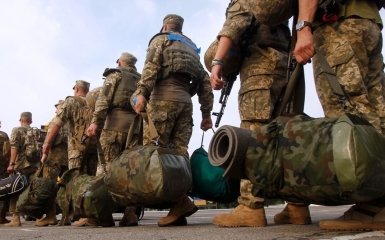The working group of the Verkhovna Rada of Ukraine, which includes representatives of all factions and groups, continues its work. They are working on improving legislation in the field of military activity.
New laws on mobilization
The Verkhovna Rada discussed the details of possible changes regarding mobilization in Ukraine. We are talking about deferment for students, teachers, conscripts and relatives of disabled people, as well as demobilization.
Mykhailo Tsymbalyuk, the first deputy chairman of the Committee on Social Policy and Protection of Veterans' Rights, said this on air during the telethon "United News".
The working group, which includes representatives of all factions and groups, continues its work. They are working on improving legislation in the field of military activity. And in the coming days, we will consider a number of draft laws, including those developed by this working group, he says.
According to Tsymbalyuk, people's deputies consult with the top military leadership to develop bills related to mobilization, demobilization and other issues of the defense sector.
And this working group includes representatives of the Armed Forces and all defense forces. That is why we proceed precisely from their practical experience and needs, he notes.
Tsymbalyuk emphasizes that it has been almost two years since the large-scale war of the Russian Federation against Ukraine has called for the mobilization of a large number of our fellow citizens, who have been for a year, and some even more, without rotation.
In order to conduct a professional rotation, it is necessary to train a certain number of servicemen of the Armed Forces of Ukraine and other defense forces, Tsymbalyuk added.
What is offered shortly:
establishment of a 90-day leave with payment of financial support for persons who have returned from captivity (including the regulation of what documents a service member or conscript must have during military training or treatment after injury and what the state must provide through military training to reduce bureaucracy);
establishment of the right to exemption from military service of stateless persons or foreigners;
establishment of the right to exemption from military service of persons with disabilities of the first and second groups;
establishment of the right to release from military service or demobilization of female cadets who prematurely terminated the contract.
Postponement issues for teachers and students
In addition, according to Tsymbalyuk, the draft law also plans to regulate the rights of teachers and lecturers of higher professional education and students pursuing higher education to postpone.
As far as teachers are concerned, this is definitely a right to postponement. As for students, there is currently a discussion on preventing violations of the individual's right to education. But what has been decided — when a person obtains a second or third higher education, to give an opportunity to complete the studies, it has definitely already been decided, the representative of the committee explained.
On the other hand, according to him, the legal department of the Verkhovna Rada will prepare proposals for those who would like to obtain a second or third higher or professional education and how this right can be limited.
But practice shows that we are working on the Ministry of Education's quotas for acquiring a profession. In fact, the problem exists in the fact that the number of those who began to acquire a second, third higher or professional education has increased tenfold. That is why we decided to standardize: if a person obtains his first higher education, the issue is not discussed, he has the right to a postponement, if he has already entered and obtains a second or third, we also resolve the issue to give him the opportunity to complete it, Tsymbalyuk stated.
Regarding the conscripted personnel
Also, according to the committee's representative, the draft law plans to grant the right to demobilize conscripts.
This is a very important question. And what's more, all of them, without exception, have already served their legal terms. Therefore, we assume that after the changes in the legislation, the Supreme Commander will have to sign the law on demobilization and all these persons will be demobilized, Tsymbalyuk says.
Regarding relatives of disabled people
In addition, according to him, the issue of how to minimize the number of caregivers of persons with the first and second groups of disabilities is being discussed.
Currently, the legislation does not limit such a number. We plan to limit it: one person of draft age has the right to deferment for caring for a disabled person, if there are no other family members who can care for him (we are talking about family members of working age, not pensioners), he noted.
Mobilization in Ukraine: what changes to expect
According to one of the journalists' insiders, a high-ranking Ukrainian official, it is primarily about using commercial recruiting companies to carry out a more targeted recruitment.
In addition, it is emphasized that conscripts can choose areas of service that correspond to their skills.
The NSDC Secretary, Oleksiy Danilov, told The Guardian that the AFU would cooperate with two of the country's largest recruitment companies to identify people with specific skills, as well as to prevent qualified Ukrainians who want to help the army but do not want to go to the front from trying to evade the draft.
Mobilization will become more flexible, those specialties that are needed will be announced, and people will apply for a specific position. For example, they need welders or locksmiths and so on, Oleksiy Danilov explained to journalists.
More on the topic
- Category
- Ukraine
- Publication date
- Додати до обраного


